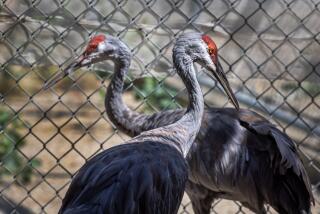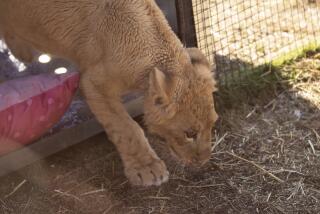Baghdad Zoo Returning to Peacetime Footing
- Share via
BAGHDAD — The animals of Baghdad Zoo survived the Gulf War thanks partly to scraps from the tables of the capital’s hotels and restaurants.
The big cats got meat only once a week and look none the worse for it.
But for Hani the lion the crisis over Iraq’s invasion of Kuwait posed a more frustrating problem--it blocked plans to find him a mate.
“We made use of food which they were throwing away from the hotels,” keeper Farhan Abid said of the war days.
“During the war even the lion and the tigers were given vegetables and bread,” said zoo director Hani Hamza Mehdi.
“The bread was left over at the hotels,” he said in an interview, adding that it also kept the monkeys and the ducks going.
Mehdi said the zoo dished up meat once a week for the carnivores, slaughtering donkeys bred for the purpose.
“We were afraid they might eat one another,” he added, half in jest.
The zoo, in the Al-Zawra Park in central Baghdad, was a popular outing before the Gulf crisis. Five months after Iraq’s defeat in the war, it is slowly returning to normal.
Families stroll from enclosure to enclosure, the children running excitedly ahead. The animals look less haggard and ratty than in the immediate aftermath of the fighting.
Peacocks preen themselves in the sunshine.
The vultures, hunched on their perches, watch the visitors with a studied indifference.
The tigers, bred from a pair brought in from Qatar in 1984, doze at the back of their cage.
The brown bear digs into a midmorning snack of vegetables and grapes.
“We do not have problems with the food now,” Mehdi said.
Donkey is still on the menu, which is just as well with meat in the shops more than five times its pre-crisis price.
But Mehdi said the zoo was running out of medicines because of the U.N. trade blockade imposed after the invasion of Kuwait last August.
The zoo moved to its present site in central Baghdad in 1973. There had been a small zoo elsewhere in the capital since the 1950s.
During the war, which coincided with the cold of winter, lack of power for heating took its toll on the zoo’s population, wiping out the collection of tropical fish.
Other inmates did not even know that was a war on.
The U.S. cruise missiles and smart bombs that obliterated Iraq’s telecommunications system and smashed the nearby airport and strategic government ministries failed to wake the zoo’s hedgehog.
“It was his time for hibernation,” said one keeper.
Today the zoo has a mix of birds, carnivores, horses, deer, a camel and . . . domestic dogs.
“It’s something unusual for a zoo,” Mehdi said. “Here in Iraq there are not many kinds of dogs. It’s to show the people other breeds.”
The zoo’s oldest inhabitant is an ostrich.
The newest arrival is a puma, which some people say came from Kuwait.
Hani, a gift from Chad as a 3-month-old cub, is now 2 years old and the only lion in Iraq.
President Saddam Hussein named him after Mehdi, who raised him by hand.
“Before Aug. 2 (1990) we had a contract to bring a lot of animals from Egypt, including a mate for the lion,” Mehdi said.
The zoo had built a special open-air enclosure for the happy couple with a suite of four cages off it. The conquest of Kuwait brought plans to a halt.
Hani now pads restlessly up and down his cage in the lion house. He roars and lunges angrily at keepers and visitors--one reason why the lion house is closed to the public.
Mehdi says that Hani, who is patently bored on his own, would be ready for a mate in about six months. “Maybe with a female he would be more relaxed.”
But with no sign of an early lifting of sanctions, he could be in for a long wait.
More to Read
Sign up for Essential California
The most important California stories and recommendations in your inbox every morning.
You may occasionally receive promotional content from the Los Angeles Times.













